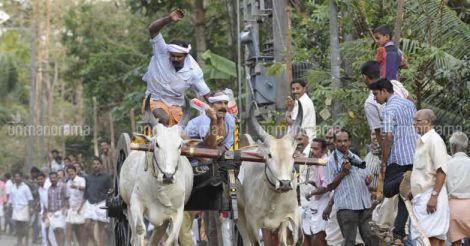Unmoved by its loss in the Jallikattu case against the Tamil Nadu government, the People for Ethical Treatment of Animals (PETA) has filed a petition against the cruelty induced against bulls during the yearly 'rekla' races held in the southern state. During 'rekla' race bulls are made to pull carts over a certain distance, whereas 'jallikattu' is a bull-taming sport.
On February 4, PETA had released a video showing the inhumane treatment imposed on the bulls participating in a popular bull taming event. The bulls are allegedly electrocuted, bitten at their tails, yanked at their noses with ropes, and beaten mercilessly in order to make them run faster during the race. They are also reportedly deprived of food and water during the 'training.'
Following the complaint filed by PETA, Coimbatore district collector has strictly prohibited any form of bull race in the region. He has promised strict action against any violators of this rule.
PETA has been fighting against the traditional bull races in many states of India for many years. It has argued that bulls are not built like horses and their heavy bodies are not made to run long distances. “The science of bovine anatomy is indisputable,” says PETA India CEO and expert cattle veterinarian Dr Manilal Valliyate. “Bullocks are not suited to running; it is a deeply stressful, physically taxing, and dangerous exercise for them.”
A detailed testimony, which describes the physiology and psychology of bulls and proves that they do not run on instinct but out of fear or in pain, was signed by scientists and officials from various prominent veterinary institutes in the country. These institutes include the Indian Veterinary Research Institute at Izatnagar, College of Veterinary and Animal Sciences at Pant Nagar, Lala Lajpat Rai University of Veterinary and Animal Sciences at Hisar, and Cummings School of Veterinary Medicine at Tufts University, US.
The testimony is supported by multiple scientific references and can be accessed by public on PETA's website.
The scientific argument of the animal rights organisation was acknowledged by the Supreme Court in 2014 and a full ban on bull races was imposed throughout the country. However, in 2017, in response to a public uprising in support of jallikattu, the Tamil Nadu government passed the Prevention of Cruelty to Animals (TN Amendment) Act. This amendment, however, did not lift the Supreme Court ban on other bull races that had rendered events like rekla illegal.


























 A scene from a bullock cart race held as part of the Kalavayal agri festival in Kerala's Muvattupuzha. Image for representation only.
A scene from a bullock cart race held as part of the Kalavayal agri festival in Kerala's Muvattupuzha. Image for representation only.